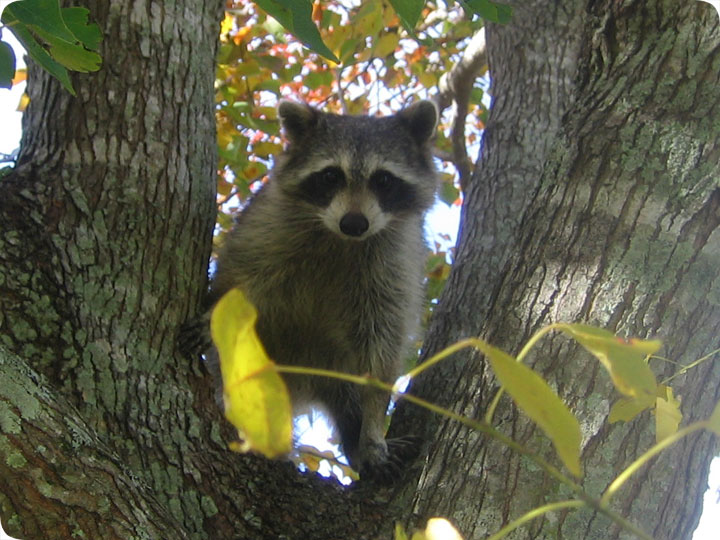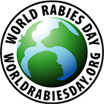-
info@aaanimalcontrol.com
Call us for help in your town
Humane Wildlife Education
Raccoon Active During the Day - Rabies?

Click here for my HOW TO GET RID OF RACCOONS comprehensive guide on raccoon removal.
Raccoons look all cute and innocent with their bushy tail, fuzzy skin, and black mask of fur around their eyes. However, these animals are not without their troubles.
03.10.2006 - One of the most common myths regarding wildlife is that a raccoon active during the daylight hours has rabies. That is just not true. I constantly receive phone calls from people who have spotted a raccoon active during the daytime, and they assume it
must be rabid, and they call me to report this information and perhaps request that I come and remove the dangerous animal.
Raccoons are primarily nocturnal animals, but
the truth is that they do frequently forage during the daylight hours as well. In particular, raccoons that haven't found enough to eat, or females who have young to feed
will need extra time to search for food, and thus they may be found moving about while the sun is up. If the animal is moving in a normal manner (as opposed to walking in
circles while falling down) it's likely healthy.

It is true that a rabid animal may be active during the day, but that's just one of many symptoms of a rabid raccoon,
including paralysis of limbs, drooling, whining, shaking, and other zany behaviors. Rabies in raccoons is simply not
common at this time here in central Florida - yet I
get calls all the time about suspicious, suspected rabid raccoons. If the animal is alert and looks healthy, these reports are most likely incorrect.
However, rabies in raccoons is common in many areas of the country. Click the image to the left for
information on Mammals and Rabies-What you Should Know.
In fact, I have a lousy neighbor who never talks to anyone.
He only talked to me one time. I came home from a day of wildlife control work, and he came storming over. I guess he could tell from my truck that I do wildlife
control work. He barked at me, "Hey buddy! I seen a raccoon out during da day today! Dat thing has rabies!" I carefully explained to him that many
healthy raccoons are active during the day, and that this is normal. "No it aint, pal! My grandfather taught me that if a raccoon is out during the day it has
rabies. It aint right!" and he stormed off. Nice neighbor.
People are very scared of rabies. Animal control offices across the US have done a
great job of containing this dreadful disease in North America. It is now extremely rare here. Alas, people get swept away when it comes to rabies, and below is an
email exchange from a lady who lost her dog because of a likely ignorant animal control official. Remember, rabies is a debilitating disease, and any raccoon in the
contagious stage will be nearly incapacitated and very sick. Unless the
raccoon is staggering around and walking in circles and slow and confused,
it's probably not rabid. If it's moving normally, is alert, looks like
it has a purpose, then it's likely fine. If it looks healthy, it almost surely is.
Below is an email exchange that I had with a customer about raccoons out during the day, and the risk of rabies:
Is a racoon coming into your yard during the day enough to constitute as an exposure risk to an unvaccinated animal or would it actually have to attack my dog?
A raccoon would actually have to have rabies, which is extremely rare, and be staggering around drooling and foaming, and then somehow bite your dog. The infectious state for a rabid raccoon is only a few days before the raccoon dies, and it has to be transferred directly. Basically, there's a reason rabies is pretty much nonexistant.
Thanks for the reply. I am having a problem getting the local animal cotrol officer to accept that. They seized my dog and cat on oct 7 due to the risk of exposure to a rabid racoon that supposedly happened on sept 25 he waited a whole week. I appealed to the Director of the health dept but he said i couldnt prove that the racoon
hadn't come into contact previous to this incident and because animal control official lied and said he had reason to believe otherwise.
I even took a letter from the vet who vaccinated them after the fact saying they had no sighns of attack and had been issued a rabies vaccination.
Unfortunately I wont be able to save them, they have 7 days as of today to be placed with a vet for 6 months or times up. We have no resources to do that locally if i could afford it. I was there he never made contact, humans were closer than my animals were not vaccinated either but have they mentioned human exposure oh no.I appreciate your thoughts thanks for taking the time, the vet on the board of health
wouldn't answer that. If you have any thoughts, opinions or suggestions feel free
I'm desperate, if not I understand theres alot of it these days really you did than you had too.
I do not know what else to suggest. I doubt the pets got rabies, but isn't the post-exposure treatment good enough? I think animal control is being very unfair.
The raccoon (Procyon lotor), is a unique animal native to North America. It's not closely related to any other animals, with distant relatives such as bears and weasels. Coons are easy to recognize, with a black mask and ringed tail. Raccoons tend to weigh between 10-20 pounds
as adults. They are mostly nocturnal, and are omnivores. Racoons average a lifespan of about 5 years in the wild, and have a litter of 3-6 young each spring. They are very strong, excellent climbers, very intelligent, and they are very skilled with their hands. Raccoons have learned to
thrive in urban areas, and live in very high densities in cities, where they eat garbage and pet food. They commonly break into homes and attics, where they cause considerable damage, and they also destroy other property, and thus racoons are considered pest animals by many people. Raccoon
control and removal, especially from inside homes, is best left to a professional.
Do it yourself: Visit my How To Get Rid of Raccoons page for tips and advice.
Get professional help: Visit my Nationwide Pro Directory of wildlife removal experts.
For more wildlife stories, click my Wildlife Blog
or click my below banner to hire a local trapper.
While it is perfectly normal to find a raccoon up and about during the day, in search of food for her young or for herself, it is still not an indication that they have rabies.
When some people see a raccoon during the day, they are sometimes quick to assume the raccoon is infected with rabies, but this is mostly untrue because there are better ways to identify an infected raccoon.
One such way is when you find them walking around in circles or staggering instead of being active and alert.
Let's find out some more about raccoons.
Physical Features
A raccoon often appears hunched when it walks or runs, and that is because its front legs are shorter than its hind legs. Also, the dark fur mask around its eye area supports its nocturnal behavior by enhancing its night vision.
A raccoon lacks thumbs, but its front paw consists of five little fingers with which it manipulates food and objects. No garbage bin, chimney flue, or even the basement is free from their prying hands.
Diet
What do these omnivores feed on every day that makes them defy their nocturnal behaviors, sometimes in search of food? Raccoons adapt very quickly to their environment, be it in the suburbs, cities, or any man-made habitat.
Hence, you are likely to find them destroying things in the basement or digging into your trashcans in search of food. Likewise, they feed on worms, crayfish, fruits, frogs, nuts, etc.
A Raccoon Active During the Daytime, Does it Have Rabies?
Raccoons are very intelligent, nocturnal, and active omnivores. They can attack your pets in the daytime and transmit the rabies virus to your pet.
Usually, after doing this, you will see them drooling or foaming.
When you sense their presence around your home, we advise that you keep your pet indoor or under your watchful eyes.
Raccoons cannot survive a rabies infection for long, and they will end up dying quickly. So the next time you are out during the day, and you see a raccoon looking weak, paralyzed and stumbling repeatedly, it probably has rabies, and you don't want to move any closer. Call your local animal control department and inform them about your findings.




















